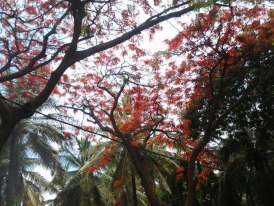The following piece was written post a series of blasts in Bangalore in 2008..today another bomb attack in the city refreshed the horror..
Terrorism kills more than just people. It blasts to bloody pieces, our faith in the ultimate rightness of all things and in the idea that life is beautiful. It shatters our innocence and the equanimity of our cities and the joy in our children’s hearts. The seven `low intensity’ blasts in Bangalore did not take many lives but they changed the way we looked at ourselves and our city. Suddenly, all of us were potential victims and all public spaces were potential blast sites.
I had gone past the Madivala bus stop many times, enjoying the green pocket that faces it. My son’s school bus zips past it everyday. But on that day, this very spot like six other blast zones in the city, was crawling with fear, sniffer dogs, policemen, television crews and incredulous people who could not believe that life can in a flash, go from normal to brutal.
My son got down from his school bus in tears, asking if we will need to hide in bunkers in the future and why people do crazy things like blowing up other people and should we leave Bangalore and build a home in the “middle of nowhere.”
I hugged him and tried in my broken Kannada to tell the toothlessly smiling fruit vendor in the distance to go home. He nodded and said, “Bomb” and gestured to me that he would be fine.
I walked away, wishing I could do something to protect my son, the vendor and his rickety cart laden with ripe jackfruit, my city and its people from more fear, from ticking bombs, mindless terrorists.
Technically, I am an outsider in Bangalore. Wasn’t born here. My Kannada is a bit wobbly but I love the place almost as much as I love my birthplace Punjab. Deep in my bone-marrow, there lives still a bit of Patiala and yes, a lot of Bangalore. It is home.
Bangalore has changed in the years I have been here. It has acquired many frustration triggers.
It is more crowded, more disparate, more grey than green, noisier, dirtier than it was.
And everyone is to blame.
Insiders. Outsiders. Government bodies. NGOs. Media. We all allowed Bangalore’s heritage and landmarks to be replaced by impersonal malls.
We did nothing when rain trees were hacked to make way for more pollution. We still do nothing when residential areas get invaded by call-centres, when almost every commercial structure is designed to trap and exude heat, when infrastructure fails every time it rains, when politicians come and go without making any difference. We only complain. All of us. About a rootless culture where children learn fraction by dividing a giant pizza in international schools and success means a Page Three clipping.
But not all is lost. Just a few mornings back, I saw, a sales girl of a big lifestyle store, plucking a small jasmine bud to slip it under her hair pin.
The gesture told me that Bangalore’s soul has survived the concretization of its gentle lanes, the untimely death of its flowering trees, the hard, glassy stares of its IT buildings, the loss of its inner silence.
It is not just a City of IT millionaires or the pub capital of India or the place where malls grow faster than trees or where gated communities are isolating people rather than bonding them organically.
Despite the hardening of its arteries, Bangalore is Bangalore because it is here that kolams appear every morning before the most modern homes to affirm tradition. It is here that Hyder Ali and Kempe Gowda co-exist peacefully and a church, a mosque and a temple make up a neighbourhood like no other around Shivajinagar.
It is here that almost every month, a festival is celebrated to remind us how beautiful life gets when we invest in it, a little ceremony, colour and sweetness.
In Bangalore, even traffic jams are sometimes touched by magic when a gulmohar flower or a leaf flutters past you. Bangalore is a city of mocha milkshakes and tender-coconut water. Bharatnatyam recitals and raindancing. Pubs and temples. Malls and flower markets. Seven-star opulence and dhobhi ghaats. Bangalore has many dimensions, many faces, many goals, many concerns. It has roots. It has wings.
Bangalore is a global brand but in its heart, it is still a small town coming to terms with the city it is expected to be.
Despite limping infrastructure, fluctuating weather and the loud foot-soldiers of CHANGE, the quintessential Bangalorean goes through life without losing either temper or poise.
I wonder if the blasts will change that. I wonder if we will become distrustful, intolerant and rabid.
The blasts brought back memories of terrorism in Punjab which I saw first-hand.
Yet Punjabiyat survived the decade long blood bath. And there is Mumbai, soldiering on despite serial blasts that play out like the keynotes of a bloody symphony every few years.
Maybe Bangalore too will get through shattering days like this and not allow the occasional attacks on its peace, get to its spirit and its heart.
Maybe.Just maybe, we won’t have to build mental bunkers to disappear into. Maybe, tomorrow or maybe the day after, my son will feel safe again.
Reema Moudgil has been writing for magazines and newspapers on art, cinema, issues, architecture and more since 1994, is an RJ, hosts a daily Ghazal show, runs unboxed writers, is the editor of Chicken Soup for The Indian Woman’s soul, the author of Perfect Eight (http://www.flipkart.com/perfect-eight-9380032870/p/itmdf87fpkhszfkb?pid=9789380032870&_l=A0vO9n9FWsBsMJKAKw47rw–&_r=dyRavyz2qKxOF7Yuc ) and an artist.






